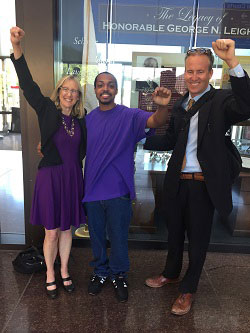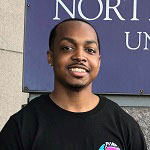
Marcel Brown with CWC attorneys Karen Daniel and Greg Swygert after his release
Marcel Brown—age 18 and a recent high-school graduate—was arrested on September 3, 2008, four days after a shooting in a Chicago park that left another teenage boy dead. Police theorized that Marcel’s cousin (age 15) fired the fatal shot, and that Marcel was accountable because he drove his cousin to and from the park. After arresting Marcel at his home, police confined him in a windowless room for 34 hours and interrogated him until he made untrue inculpatory statements, which were the sole basis for his first-degree murder conviction and 35-year sentence. The lengthy and intense interrogation was a textbook example of how to make an innocent teenager confess to something he did not do.
An attorney from the Office of the State Appellate Defender referred the case to the Center on Wrongful Convictions because Marcel’s trial attorney (later suspended from the practice of law) never challenged the involuntary custodial statement. Further, although the interrogation was video-recorded as required by Illinois law, Marcel’s trial attorney did not use it to his advantage at trial, but instead stipulated to a detective’s inaccurate summary of the interrogation. CWC attorneys Karen L. Daniel and Gregory Swygert, and their students, took on Marcel’s case as a post-conviction matter.
The police interrogation was clearly coercive, and the CWC team obtained an expert opinion to that effect. The CWC’s investigation further revealed that Marcel was not accountable for anything illegal his cousin might have done that evening, and moreover, that Marcel’s cousin was not the person who shot the victim. The CWC team also learned that Marcel’s mother retained an attorney to represent Marcel at the police station after his arrest, but officers refused to let the attorney speak with Marcel. Under the Illinois Constitution, a waiver of the right to counsel is not valid if the police turn away an attorney who appears at a police station to represent a suspect; therefore, Marcel’s statements should not have been admissible.
The CWC team filed a post-conviction petition citing the denial of access to counsel at the police station, the involuntary statements during the interrogation, the ineffective assistance of trial counsel, and Marcel’s actual innocence. Cook County Circuit Court Judge Thomas V. Gainer—who originally found Marcel guilty after a bench trial but who never saw the interrogation video or knew about the other issues cited in the petition—set the case for an evidentiary hearing. The parties agreed to begin by presenting evidence on the denial-of-access-to-counsel claim.
Judge Gainer found that the attorney who had been turned away from the police station testified credibly, and that his testimony was corroborated by debit card records showing that Marcel’s mother withdrew money from an ATM located inside the police station to pay the attorney. Judge Gainer ruled that Marcel’s rights were violated and ordered a new trial at which all statements Marcel made after his attorney arrived at the police station (which was most of them) were excluded. On July 12, 2018, the State declined to appeal and dropped all charges. Marcel left the courthouse and strode into the waiting arms of his exuberant family—a free man for the first time in a decade.
CWC clinic students worked side by side with the CWC attorneys over the years on the initial case investigation, the document drafting, the location of the critical debit card records, and the presentation of the evidence at the evidentiary hearing. These students included Sylvia Baraniewski (’16), Alex Hirschhorn (’16), Alex Jacobs (’16), Ania Mikulski (’16), Whitney Woodard (’16), Beth Holtzman (’17), Frances Guerrero (’18), Taylor Mullaney (’18), and Anne Hudson (’19).
Marcel’s cousin Renard Branch Jr., who was also convicted of first-degree murder, similarly filed a post-conviction petition. On December 27, 2018, in his last act as a judge before his retirement, Judge Gainer granted Renard a new trial based on ineffective assistance of trial counsel. Renard was represented in the post-conviction proceedings by pro bono counsel from Latham & Watkins.

